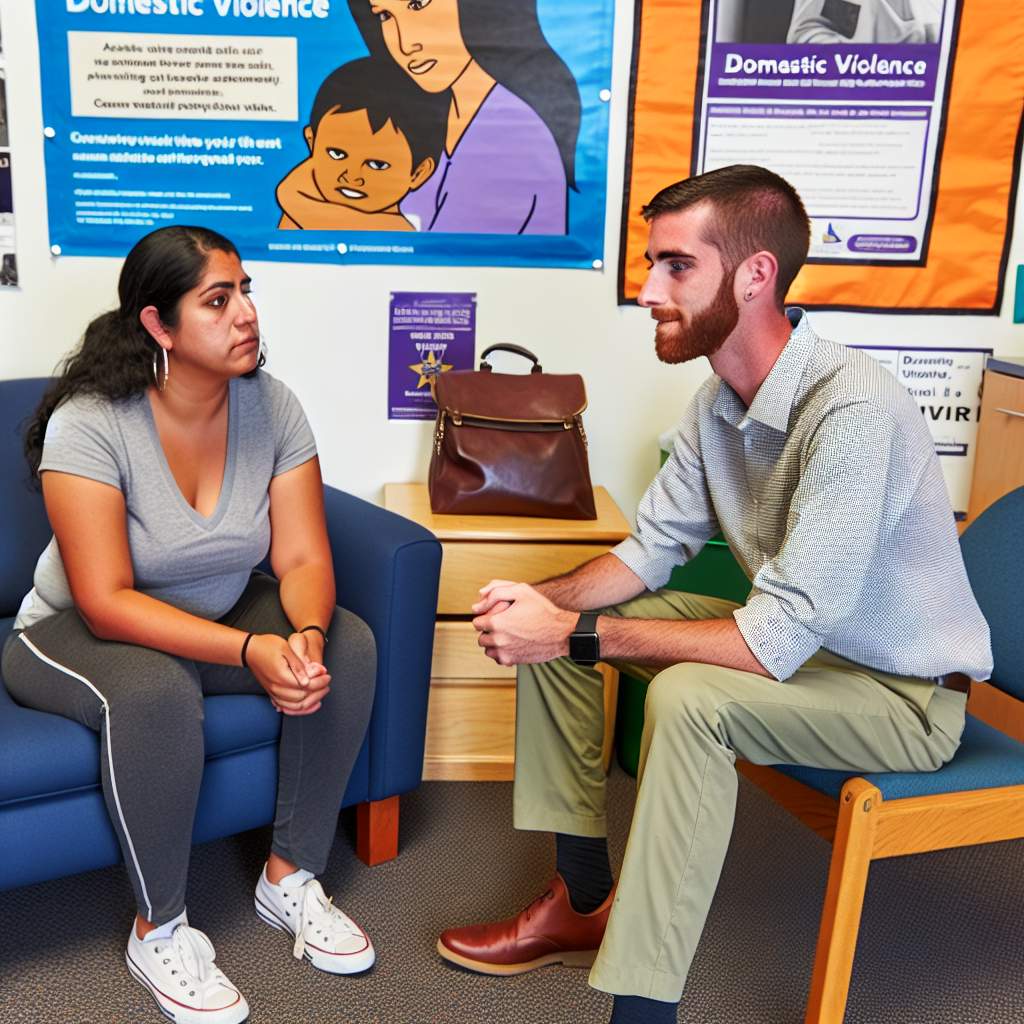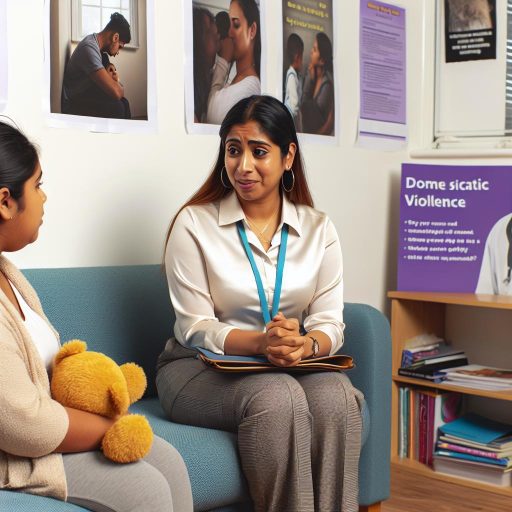Introduction:
Faith-based organizations are religious entities that provide services based on their beliefs.
Domestic violence is a pattern of abusive behavior in a relationship.
It is crucial to discuss the role of faith-based organizations in addressing domestic violence.
Historical perspective:
Faith-based organizations have a long history of addressing social issues within communities.
In the past, faith-based organizations often approached domestic violence with a focus on family unity and forgiveness.
Influential faith-based organizations like the Salvation Army and Catholic Charities have been actively involved in addressing domestic violence.
Evolution of approaches:
Over time, faith-based organizations have shifted towards a more victim-centered approach.
They now emphasize the importance of safety, empowerment, and accountability for perpetrators.
This shift reflects a deeper understanding of the complexities of domestic violence dynamics.
Challenges faced:
Despite their efforts, faith-based organizations often face challenges in addressing domestic violence effectively.
Limited resources, lack of specialized training, and cultural barriers can hinder their impact.
Overcoming these challenges requires collaboration with experts, advocacy groups, and other community stakeholders.
Current initiatives and programs:
Many faith-based organizations now offer domestic violence prevention programs and support services.
These programs may include crisis hotlines, counseling services, support groups, and emergency shelter accommodations.
By providing a safe space for survivors to seek help, faith-based organizations play a crucial role in breaking the cycle of abuse.
Collaboration with secular organizations:
Faith-based organizations are increasingly working in partnership with secular organizations to combat domestic violence.
This collaboration allows for a more comprehensive and coordinated response to the issue.
By pooling resources and expertise, faith-based and secular organizations can better support survivors and hold abusers accountable.
Advocacy and education:
Faith-based organizations also play a vital role in advocating for policy changes and raising awareness about domestic violence.
Through education and outreach efforts, they help reduce stigma, promote prevention strategies, and empower communities to take action.
Transform Your Career Today
Unlock a personalized career strategy that drives real results. Get tailored advice and a roadmap designed just for you.
Start NowBy engaging congregations and community members, faith-based organizations create a network of support for survivors and promote a culture of accountability.
Current Initiatives:
With the alarming rates of domestic violence, faith-based organizations have stepped up to address this issue through various programs and initiatives.
Explore current programs and initiatives:
- Many faith-based organizations offer counseling services for survivors of domestic violence.
- Some churches and mosques provide safe shelters for victims fleeing abusive situations.
- Several religious institutions conduct educational workshops to raise awareness about domestic violence.
- Faith-based organizations also collaborate with law enforcement and social services to ensure the safety of survivors.
Discuss the impact of these initiatives:
- These programs provide vital support and resources for survivors who may feel trapped or isolated.
- By offering counseling and shelter, faith-based organizations empower survivors to break free from abuse.
- Educational workshops help communities recognize signs of abuse and intervene to prevent further harm.
- Collaboration with law enforcement ensures that survivors receive the protection they need to escape violence.
Highlight success stories and challenges:
- Success stories showcase the transformative impact of faith-based initiatives on survivors’ lives.
- Survivors who have received support from these organizations often share stories of healing and empowerment.
- Challenges faced by faith-based organizations include limited resources and funding to sustain their programs.
- Some organizations struggle to overcome cultural or religious barriers that may prevent survivors from seeking help.
Faith-based organizations play a crucial role in combating domestic violence by providing support, education, and resources for survivors.
Despite facing challenges, these initiatives have a significant impact on individuals and communities affected by abuse.
You Might Also Like: How School Social Workers Aid Student Development
Collaboration with other stakeholders:
Collaboration between faith-based organizations and other stakeholders is crucial in addressing domestic violence.
By working together, they can pool resources, expertise, and networks to create a more comprehensive response to this widespread issue.
Importance of collaboration:
- Sharing information and best practices
- Maximizing impact through coordinated efforts
- Supporting survivors with a holistic approach
- Advocating for policy changes and legal reforms
By collaborating with government agencies, faith-based organizations can influence the development of policies and programs that address the root causes of domestic violence.
Non-profit organizations bring additional resources and services to the table, further enhancing the support available to survivors.
Successful collaborations in addressing domestic violence:
- Interfaith partnerships offering counseling services
- Joint awareness campaigns with local law enforcement
- Training programs for clergy on handling domestic violence cases
These collaborations not only provide immediate support to survivors but also work towards prevention and education within the community.
By leveraging the strengths of each stakeholder, a more effective and sustainable response can be achieved.
Benefits of a multi-sector approach:
- Increased resources and funding opportunities
- Broader reach and impact on diverse communities
- Comprehensive support services for survivors
- Enhanced advocacy efforts for policy change
Ultimately, a multi-sector approach to tackling domestic violence ensures that the needs of survivors are met from all angles.
By working together, faith-based organizations, government agencies, and non-profit organizations can create a more supportive and empowering environment for those affected by domestic violence.
Discover More: The Role of Education in Preventing Domestic Violence
Support services offered:
Faith-based organizations typically offer counseling services to survivors of domestic violence.
They provide emotional support, guidance, and a safe space for survivors to share their experiences.
Many faith-based organizations also offer practical assistance, such as shelter, food, and clothing for survivors.
Some faith-based organizations provide legal advocacy and help survivors navigate the legal system.
How these services differ:
- One key difference is the spiritual and religious component that faith-based organizations offer.
- These organizations often incorporate prayer, meditation, and scripture into their support services.
- Secular organizations, on the other hand, focus solely on practical and emotional support without the spiritual aspect.
Role of faith and spirituality:
- For many survivors, faith and spirituality can be a source of strength and comfort during the healing process.
- Connecting with their faith communities can provide survivors with a sense of belonging and support.
- Faith-based organizations often emphasize forgiveness, redemption, and healing through faith as part of the recovery journey.
- Survivors may find solace in prayer, rituals, and spiritual practices that help them cope with the trauma of domestic violence.
Learn More: Tips for Effective Rehabilitation Counseling Sessions

Advocacy and Awareness
One of the key roles of faith-based organizations in addressing domestic violence is through advocacy efforts to raise awareness about this issue.
Transform Your Career Today
Unlock a personalized career strategy that drives real results. Get tailored advice and a roadmap designed just for you.
Start NowThese organizations play a crucial role in educating and mobilizing their congregations and communities to take action against domestic violence.
Outline the Advocacy Efforts of Faith-Based Organizations to Raise Awareness About Domestic Violence
Faith-based organizations often use their platforms, such as sermons, workshops, and community events, to shed light on the prevalence and impact of domestic violence.
They provide resources and information to help individuals recognize the signs of abuse and seek help.
Discuss How Faith-Based Organizations Leverage Their Platforms to Promote Education and Prevention Strategies
These organizations collaborate with experts in the field of domestic violence to develop educational programs and prevention strategies that are rooted in faith teachings.
They emphasize the values of love, respect, and equality in relationships and offer support to victims of abuse.
Provide Examples of Successful Advocacy Campaigns Led by Faith-Based Organizations
One example is the Purple Ribbon Sunday campaign, where churches across the country dedicate a Sunday service to raising awareness about domestic violence.
Another example is the Walk a Mile in Her Shoes event organized by faith-based organizations to engage men in the fight against domestic violence.
Faith-based organizations play a critical role in advocating for victims of domestic violence, raising awareness about this issue, and promoting education and prevention strategies within their communities.
Through their advocacy efforts, these organizations are helping to create a society free from the cycle of abuse.
Find Out More: Career Path of a Disability Services Coordinator
Cultural Considerations:
When it comes to addressing domestic violence within different cultural contexts, faith-based organizations play a crucial role.
These organizations often have deep roots within specific communities, which enables them to provide tailored support and intervention strategies.
Here’s a closer look at the impact of faith-based organizations in addressing domestic violence from a cultural perspective:
Role of Faith-Based Organizations:
- Faith-based organizations serve as trusted spaces where survivors can seek help and find refuge.
- They often have connections with community leaders who can facilitate conversations about domestic violence.
- These organizations can incorporate cultural practices and traditions in their support services.
Impact of Faith and Cultural Beliefs:
- Faith and cultural beliefs can influence survivors’ willingness to seek help for domestic violence.
- Some cultures may view domestic violence as a private matter, making it challenging for survivors to speak out.
- Religious teachings and cultural norms can either empower or inhibit survivors from seeking assistance.
Importance of Culturally Sensitive Approaches:
- It is essential for faith-based organizations to be culturally sensitive in their approach to addressing domestic violence.
- Understanding cultural nuances and practices can help organizations provide more effective support to survivors.
- Culturally sensitive approaches can foster trust and openness among survivors who may be hesitant to seek help.
Recognizing the intersection of faith, culture, and domestic violence is vital in the work of faith-based organizations.
By embracing culturally sensitive practices and incorporating cultural beliefs into their intervention strategies, these organizations can better serve survivors and contribute to the prevention of domestic violence within diverse communities.
Support Provided by Faith-Based Organizations
Faith-based organizations offer crucial support to domestic violence survivors.
They provide a safe space, counseling, and resources for healing and empowerment.
It’s essential to recognize the significant role these organizations play in addressing domestic violence.
Supporting and engaging with faith-based initiatives advances social justice.
Together, we can work towards creating a society free from domestic violence and promoting healthier relationships.
Transform Your Career Today
Unlock a personalized career strategy that drives real results. Get tailored advice and a roadmap designed just for you.
Start NowAdditional Resources
Virginia Department of Social Services: Home
Faith and Community Based Services
[E-Books for Sale]
The Big Book of 500 High-Paying Jobs in America: Unlock Your Earning Potential
$19.99 • 500 High-Paying Jobs • 330 pages
Explore 500 high-paying jobs in America and learn how to boost your career, earn more, and achieve success!
See All 500 High-Paying Jobs of this E-Book
1001 Professions Without a Degree: High-Paying American Jobs You Can Start Now
$19.99 • 1001 Professions Without a Degree • 174 pages
Discover 1001 high-paying jobs without a degree! Unlock career tips, skills, and success strategies for just $19.99!




